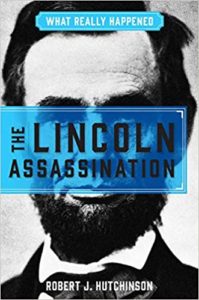 This April marks the 155th anniversary of the killing of President Abraham Lincoln by the actor John Wilkes Booth.
This April marks the 155th anniversary of the killing of President Abraham Lincoln by the actor John Wilkes Booth.
Around 10:20 p.m. on Good Friday, April 14, 1865, Booth snuck up behind Lincoln at Ford’s Theater in Washington, DC.
The actor fired a.44 caliber derringer into the back of Lincoln’s head, then jumped onto the stage and fled out the back door.
Although countless books and films have depicted the deed over the decades, many details are still unknown.
For example, who was behind Lincoln’s assassination – and what purpose did it serve?
What happened to Lincoln’s bodyguard?
Did Booth break his leg when he jumped onto the stage as he claimed in his diary – or did he break it later?
What did Booth say on stage? And how was the pampered actor able to elude the largest manhunt in U.S. history for eleven days despite being unable to walk?
Fanatical Hatred for the President
Like celebrities today, Booth had contempt for the Republican president.
Yet in real life, Booth was a lover, not a fighter. How could such an untrained amateur pull off one of history’s greatest acts of terrorism?
After a Union soldier called him a coward for not being in uniform, Booth spent the previous year organizing a plot to kidnap Lincoln. His plan had been to waylay Lincoln on one of his rides around Washington, then
transport him south as a hostage for the exchange of prisoners.
But was this Booth’s idea – or did he have help Confederate leaders?
Assassination expert Edward Steers, Jr., points out that Booth promised his accomplices huge financial rewards from the South.
Yet Booth’s kidnapping attempts were so inept other historians doubt the Confederate government was involved.
Disputed Details of the Assassination
No one really knows what happened with Lincoln’s bodyguard, during the assassination. He was last seen with audience members drinking at the next-door Star Saloon.
Lincoln’s personal assistant, Charles Forbes, who was sitting outside the presidential box, initially stopped Booth from entering. But the actor simply handed Forbes a calling card and said he needed to speak with the president – and was allowed in.
In his diary, Booth claimed he yelled Sic Semper Tyrannis – Thus Always to Tyrants — before he fired. The actor was responding to newspaper denunciations of him as a coward who shot an Lincoln from behind.
Yet two eyewitnesses reported that Booth yelled Sic Semper from the stage, not the box.
Booth also wrote that he broke his leg during the jump to the stage and that, as he rode away, he could feel “the bones of my leg tearing the flesh at every jump.”
However, no contemporary witness reported seeing Booth limp at all. Booth’s biographer Michael Kaufmann believes the actor broke his leg later, during a fall from his horse.
Finally, the nation only learned twenty years after the assassination how Booth was able to evade capture for so long.
As recounted by Confederate smuggler Thomas Jones, Booth and an accomplice appeared hiding near Jones’s Maryland farm on the night of April 15.
Although he could have expected a $50,000 reward if he turned Booth in and possible execution if he did not, Jones agreed to help the fugitives escape. Jones advised Booth simply to stay hidden in plain sight – in a dense pine thicket near the Potomac River.
Jones would bring food if the men agreed to lie quietly on the ground, without a fire, until search parties gave up and moved on.
That is precisely what Booth did, for five long, cold, wet days. The strategy worked. For the nation’s desperate leaders, it appeared Lincoln’s killer had simply vanished.
On April 23, eight days after the shooting, Booth crossed the Potomac River to Virginia.
Over the next three days, a series of coincidences would lead detectives to the Virginia farmhouse where Booth spent his last day. Trapped in a locked barn that was deliberately set on fire, Booth was shot in the neck by a soldier through an opening in the barn wall.
 A showman to the end, Booth repeatedly whispered what he hoped would be his final words for the history books, “Tell mother, I die for my country.”
A showman to the end, Booth repeatedly whispered what he hoped would be his final words for the history books, “Tell mother, I die for my country.”
Despite decades of obsessive research, the full truth of assassination may never be known. We know what happened – but not all the details of how and why.
Click here to order a copy of my brand-new book, What Really Happened: The Lincoln Assassination.
